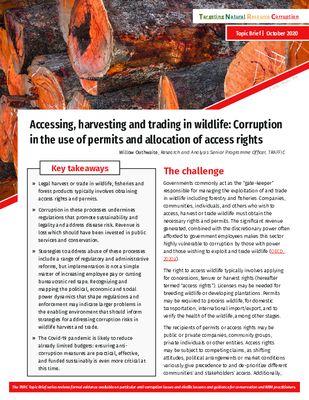Accessing, harvesting and trading in wildlife: Corruption in the use of permits and allocation of access rights

Legal harvest or trade in wildlife, fisheries and forest products typically involves obtaining access rights and permits. Corruption in these processes undermines regulations that promote sustainability and legality and address disease risk. Strategies to address abuse of these processes include a range of regulatory and administrative reforms, but implementation is not a simple matter of increasing employee pay or cutting bureaucratic red tape. Recognizing and mapping the political, economic and social power dynamics that shape regulations and enforcement may indicate larger problems in the enabling environment that should inform strategies for addressing corruption risks in wildlife harvest and trade.
Key Takeaways
- Legal harvest or trade in wildlife, fisheries and forest products typically involves obtaining access rights and permits.
- Corruption in these processes undermines regulations that promote sustainability and legality and address disease risk. Revenue is lost which should have been invested in public services and conservation.
- Strategies to address abuse of these processes include a range of regulatory and administrative reforms, but implementation is not a simple matter of increasing employee pay or cutting bureaucratic red tape. Recognizing and mapping the political, economic and social power dynamics that shape regulations and enforcement may indicate larger problems in the enabling environment that should inform strategies for addressing corruption risks in wildlife harvest and trade.
- The COVID-19 pandemic is likely to reduce already limited budgets: ensuring anti-corruption measures are practical, effective, and funded sustainably is even more critical at this time.


